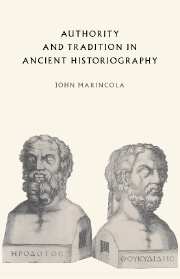Book contents
II - THE HISTORIAN'S INQUIRY
Published online by Cambridge University Press: 29 January 2010
Summary
At the court of the Phaeacians, Demodocus sings of the quarrel between Odysseus and Achilles and delights his listeners, all except the still-unrevealed Odysseus who covers his head and weeps. During the feast that follows, Odysseus, despite his grief, sends the singer a rich portion of meat and salutes him, praising how well he sang ‘all that the Achaeans did and suffered and toiled, as if you were present yourself, or heard it from one who was’. In this simile, Odysseus anticipates the twin methods of validation for contemporary historians: eyewitness (autopsy) and inquiry of the participants in events. In ancient historiography, professions of autopsy and inquiry are found from Herodotus to Ammianus, and they serve as one of the most prominent means of claiming the authority to narrate contemporary and non-contemporary history. In this chapter, we shall survey some of the issues revolving around inquiry for ancient historians, treating the theoretical observations of the historians on the difficulties and problems raised by inquiry, as well as the explicit claims made by historians in the course of their narratives.
EYES, EARS AND CONTEMPORARY HISTORY
In Greek historiography, reliance on autopsy and inquiry is first found in developed form in Herodotus but, not surprisingly in view of the Greek capacity for examination, a long tradition of reliance on, and questioning of, the validity of this type of knowledge lies behind the first historian.
- Type
- Chapter
- Information
- Authority and Tradition in Ancient Historiography , pp. 63 - 127Publisher: Cambridge University PressPrint publication year: 1997
- 4
- Cited by



